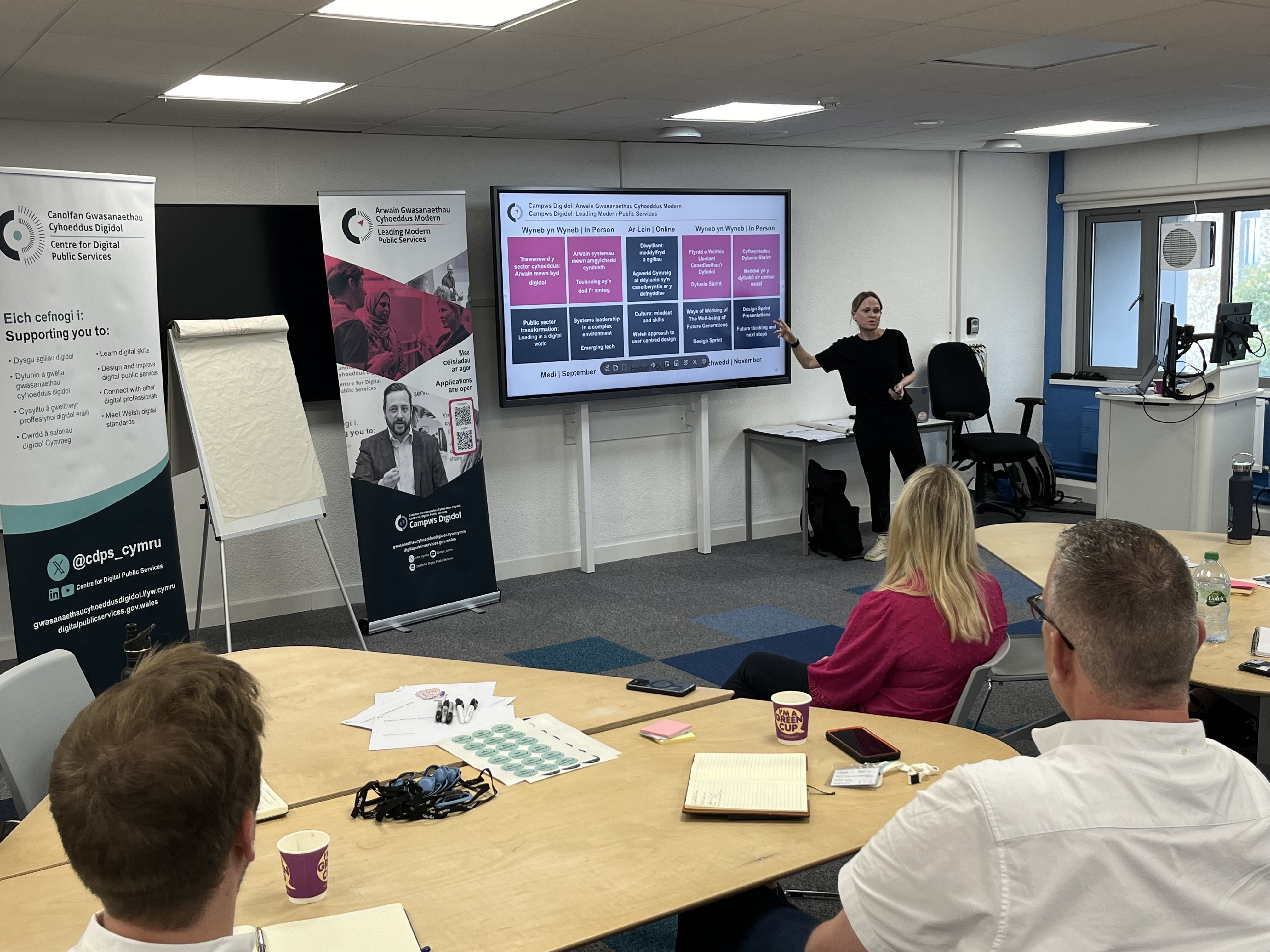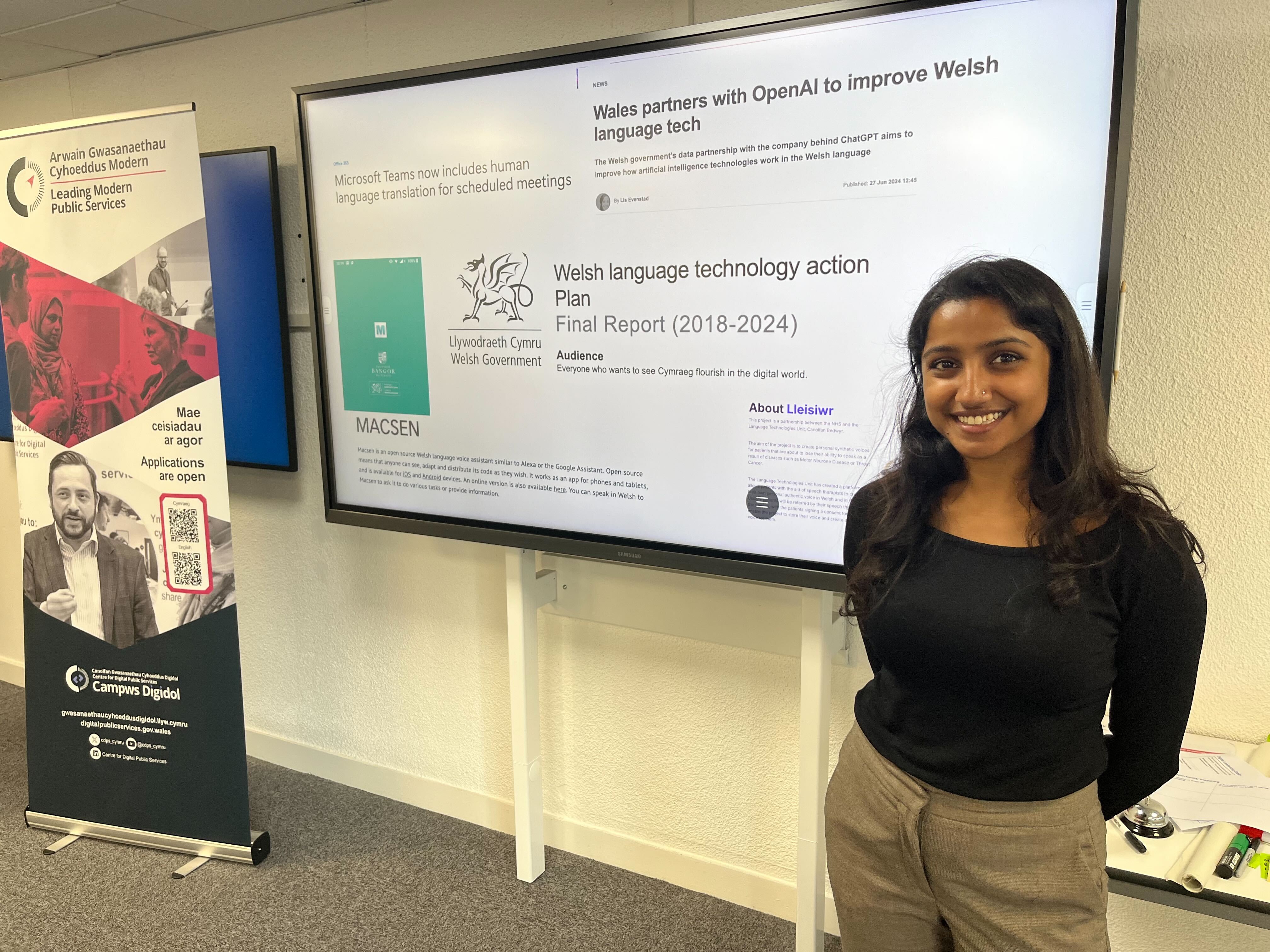September marked the launch of the 'Leading modern public services' programme in Wales. Over the coming months we will bring together 15 senior leaders, service owners and aspiring leaders from 9 organisations across Wales, committed to transforming how public services are delivered in a modern, digital world.
The programme has been designed by the Centre for Digital Public Services (CDPS) and TPXimpact, to equip public service leaders with the knowledge, tools, and strategies to shape the future of digital public services in Wales. Our leaders will learn and network over five day-long sessions through September to November. This programme is sponsored by the University of Wales Trinity Saint David, who are kindly hosting in-person sessions for our first cohort in Swansea.
The first two days of the programme created a great foundation for the cohort, packed with insights from speakers working in the digital field.

Day 1: Setting the stage for transformation
Welcome and overview
The programme began with an enthusiastic welcome from Peter Thomas, Head of Digital Skills and Capability at CDPS, and Mike Erskine, Communications Manager at CDPS. Their opening remarks highlighted the significance of digital leadership in the evolving public sector landscape and the importance of fostering multi-disciplinary teams to tackle the complex challenges facing public services today.
I (Tash Willcocks, Head of Learning Design at TPXimpact) began with a warmup session, encouraging participants to reflect on their own experiences and contexts. This helped set the stage for open dialogue and collaborative learning throughout the course. Collaboration is a central theme across the programme.
Understanding digital transformation
Myself and Ben Holliday, Chief Design Officer at TPXimpact and author of Multiplied, opened an interactive discussion with the cohort, posing the question ‘What is digital transformation in your context?’. We encouraged participants to define digital transformation within their own organisations, considering both the opportunities and challenges they face.
Ben followed with an in-depth introduction to digital transformation, covering key drivers, benefits, and the pressing reasons for investing in digital innovation. Ben emphasised that digital transformation is not just about technology, but about rethinking service design, putting users at the centre, and creating a culture of continuous improvement.
Exploring digital maturity
There was a hands-on workshop on digital maturity, where participants worked through an exercise to assess their organisations' digital maturity. They identified where they are on their journey and what steps are needed to move forward.
Insights from Carmarthenshire County Council
The afternoon session featured a keynote from Gareth Jones, Chief Digital Officer at Carmarthenshire County Council. Gareth shared real-world examples of how digital transformation is being implemented in local government, particularly how multi-disciplinary teams are essential to successful change. His reflections highlighted the importance of leadership in creating an environment where innovation can flourish, and how digital initiatives must always be designed with people at their heart.
One of Gareth’s key takeaways, echoed throughout the day, was that ‘everything we do requires multi-disciplinary teams. We can’t do it on our own.’

Day 2: Systems leadership, the wider Welsh context and ethical considerations
Reflecting on day 1 and introducing systems leadership
The second day began with a reflective session. We asked participants to think about the challenges and opportunities discussed the day before, followed by an introduction to systems leadership. Systems leadership is a concept that stresses leading beyond boundaries, recognising the interdependencies between different parts of the public service system, and driving collective action for large-scale change.
Systems leadership resonated strongly with the cohort, especially given the cross-organisational nature of public services in Wales. As leaders, the participants were challenged to think about how they can influence, not just their own teams, but the wider ecosystem in which they operate.
Agile approaches: The good, the bad, and the ugly
For our introduction to Agile methodologies, we arranged the cohort into small teams around people familiar with Agile ways of working and those less familiar. Rather than a traditional lecture, participants engaged in group discussions to share their own experiences of implementing Agile practices in their organisations. The room was alive with stories of success, as well as candid admissions of what hadn’t worked as planned. This session provided valuable insights into the realities of adopting an Agile mindset.
Sport Wales and CDPS case study
After a lunch break, the cohort was joined by Steffan Berrow from Sport Wales. Steffan shared how Sport Wales partnered with CDPS to apply user-centred design and Agile methods to their community sports grant application process. Steffan explained how this approach has made the grant process more inclusive, ensuring that it better serves all potential applicants. His case study provided a tangible example of how digital tools and design thinking can be applied to deliver better public services.
Artificial intelligence: ethics and governance
As public services increasingly embrace artificial intelligence, ethical considerations must be at the forefront of any discussion around the implementation of new technologies. Smera Jayadeva, from The Alan Turing Institute, gave a thought-provoking presentation on AI ethics, governance, and procurement. Smera’s talk challenged participants to think critically about the impact of AI on public services, particularly in areas such as data privacy, bias, and accountability.

World Café: Reflecting on Challenges and Opportunities
Day 2 concluded with a World Café session. The World Café is a method where participants to explore issues by discussing them in small table groups. Participants discussed the three areas covered across the day. These were:
- systems leadership and connectivity
- challenges in ethics and technology
- how the Welsh digital landscape can support them to tackle current challenges in their organisations, and overcoming barriers to digital transformation
Participants travelled from cafe to cafe building up insights with the hosts and then shaping them into challenges for the future sessions.
Looking ahead
‘It’s only been two days, but I already feel like I’ve gained a wealth of knowledge and insight as well as networking with some brilliant colleagues from across the public sector that will not only benefit my work but also shape the future of how we deliver public services.’ - Athena Jones, Assistant Operations Manager at Betswi Cadwaladr University Health Board (participant on the Leading Modern Public Services programme).
The first two days of the 'Leading modern public services' programme were incredible. It was great to see a group of strangers work together so brilliantly on shared problems and challenges, creating connections and sharing best practice. With a focus on collaboration, leadership, and ethical innovation, the participants are already starting to reimagine how they can lead their organisations through digital change. As the programme continues, we look forward to diving deeper into these conversations and supporting Wales’s public service leaders to shape a brighter, more inclusive future. I feel we have set the stage for transformative times ahead.
The next session will run online in October, followed by 2 more in-person sessions in November.
Are you interested in joining a future cohort of the ‘Leading modern public services’ programme? Find out more about how to apply.
